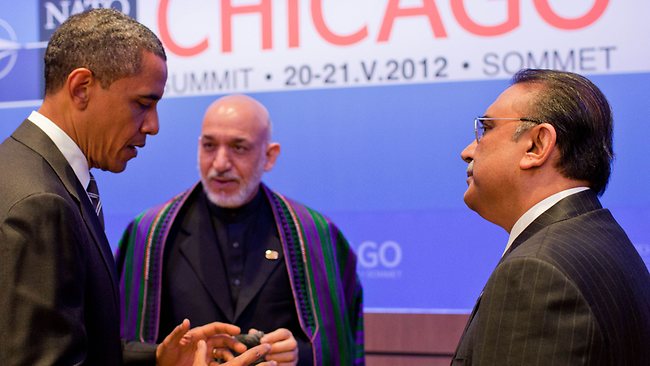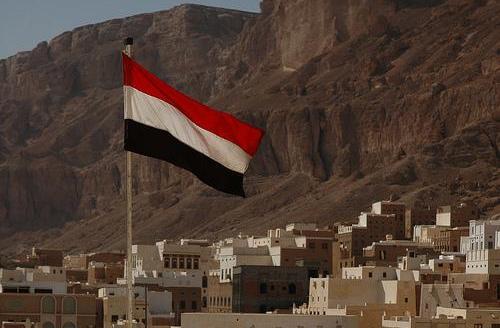[captionpix align=”left” theme=”elegant” width=”320″ imgsrc=”http://resources0.news.com.au/images/2012/05/22/1226363/028196-120522-zardari.jpg”]
Tensions between Pakistan and the US are at an all time high following President Obama’s unsuccessful bid at the Chicago Summit to pressure Pakistan’s President, Asif Ali Zardari, into reopening the Salala supply route, used to funnel NATO supplies into Afghanistan. The last minute invitation extended to Pakistani officials was a gamble that the very public international conference, with 60 world leaders in attendance, would force Zardari’s hand. It is clear that this risky venture did not pay off as both parties departed Chicago without any sort of agreement.
The US President aired his frustrations with Pakistan while addressing world leaders on Monday. With Zardari sitting only a few feet away, Obama stated, “I want to welcome the presence of President Karzai as well as officials from Central Asia and Russia — nations that have an important perspective and that continue to provide critical transit for ISAF supplies” — an unmistakable snub at Zardari’s closure of the supply route. The extent of the rift was on full display at the Summit when Defence Secretary, Leon Panetta, met with officials from Kazakhstan, Kyrgyzstan, Tajikistan, Turkmenistan, and Uzbekistan to convey his “deep appreciation” for all of their cooperation in serving as alternative routes for NATO supplies due to Pakistan’s unwillingness to come to an agreement. Since the closure six months ago, NATO has trucked over half of its non-lethal supplies through these countries and flies the rest via cargo jet — an endeavor that has cost the US over $1-billion since November.
A Risky Gamble
After this public rebuke of Pakistan, President Obama and NATO Secretary General, Anders Fogh Rasmussen, cut-off interaction with Zardari by giving him the silent treatment. Obama declined to grant a formal one-on-one meeting and the Secretary General followed suit by cancelling a scheduled meeting with Pakistani officials. The only access to US officials that Zardari had was a brief conversation with Secretary of State Hillary Clinton. A three-way exchange between Obama, Karzai, and Zardari did occur on the sidelines of the Summit, but US officials were quick to establish that these were not a part of any formal bilateral discussions.
This hardline stance was a precarious move for the US to pursue, as it risked not only aggravating Pakistani officials, but also leaving Zardari in a weak political state at home, less capable of fending off anti-US sentiment over numerous issues, including the bin Laden raid and unmanned drone strikes in Pakistan territory. The manner in which Obama sought to force Zardari into submission at the Summit was not successful and may have repercussions that are yet to be felt given the tumultuous relationship between the two — such as the indefinite perpetuation of the Salala route closure.
[captionpix align=”left” theme=”elegant” width=”320″ imgsrc=”http://upload.wikimedia.org/wikipedia/commons/thumb/0/0b/NATO_supply_routes_through_Pakistan.svg/450px-NATO_supply_routes_through_Pakistan.svg.png”
” captiontext=”NATO Supply Routes Through Pakistan.”]
What’s At Stake?
The supply route is crucial, not only for delivering supplies into Afghanistan, but also for the timely and orderly removal of foreign troops and a decade’s worth of materials and equipment. Pakistan closed access to the route in November after the US refused to deliver an unconditional apology for an airstrike that killed 24 Pakistani soldiers on a border post. Unwilling to offer an unconditional apology, Secretary Clinton instead extended condolences and expressed regret over the incident — something that did little in the eyes of the Pakistanis. In addition to the apology, Zardari is seeking to raise the price of admission into Afghanistan through Pakistan by putting a price tag of $5000 per truck, before the flow of supplies is permitted to resume. This is a dramatic increase from the $250 fee that existed before November; numerous US Senators have called the new price “extortion.” Rightfully, the US is outraged at such a ridiculous proposal, though they are willing to negotiate a new fee of around $500 per truck. The outcome of the Chicago Summit has shown that officials from both countries are not able to close this substantial difference in opinion regarding remuneration to the Pakistani government.
Seemingly, Pakistan has far more to lose if an agreement is not struck on the reopening of the supply route. In addition to the revenue lost by closing passage to Afghanistan, Congress is now in talks to freeze $650-million in payments to Pakistan until Islamabad reopens the supply line.
For the US, an agreement on reopening the supply route into Afghanistan is more focused on the transition out of the country in 2014. It is also a means to an end in keeping fragile bilateral relations between the two countries as composed as possible. Whether the US likes it or not, Pakistan is essential in bringing the Taliban into negotiations and will play a role in Afghanistan’s internal security environment after the withdrawal. Both countries are required to maintain this difficult, but essential relationship because it is in both of their interests to do so.
[captionpix align=”left” theme=”elegant” width=”320″ imgsrc=”http://i.telegraph.co.uk/multimedia/archive/02068/pakistan2_2068240b.jpg”
captiontext= “Source: AFP
A Pakistani security personnel stands guard beside trucks carrying supplies for NATO forces in Afghanistan that are parked at the border crossing after Pakistani authorities suspended NATO supplies on November 27, 2011.”]
Dangerous Games
It has been suggested that the real reason for Zardari’s reluctance to settle on a fee is being driven by Pakistan’s looming election season that will see his ruling party, the Pakistan People’s Party, contend to remain in power. By avoiding a deal with the US, Zardari placates opposition parties and the powerful right-wing Mullahs who oppose NATO convoys travelling through Pakistan. This is a dangerous move. If Zardari is dragging his feet on a deal, he risks losing millions of dollars from the US while isolating Pakistan and creating lasting damage among US and NATO allies.
Before the Chicago Summit numerous Pakistani officials, including the Prime Minister and Foreign Minister, were quick to provide reassurance that the dispute would soon be settled. However, Obama’s attempt at publicly pressuring Zardari into submission over the supply route at the Chicago Summit widened the rift between the two nations. Nevertheless, if Zardari’s motivations are to pacify conservatives in order to maintain his presidency then this dispute is more complicated than it appears on the surface. If Zardari were playing the long game, he would realize that his negotiating strategy could cost Pakistan more than he bargained for, with consequences reaching much further than the next election.



